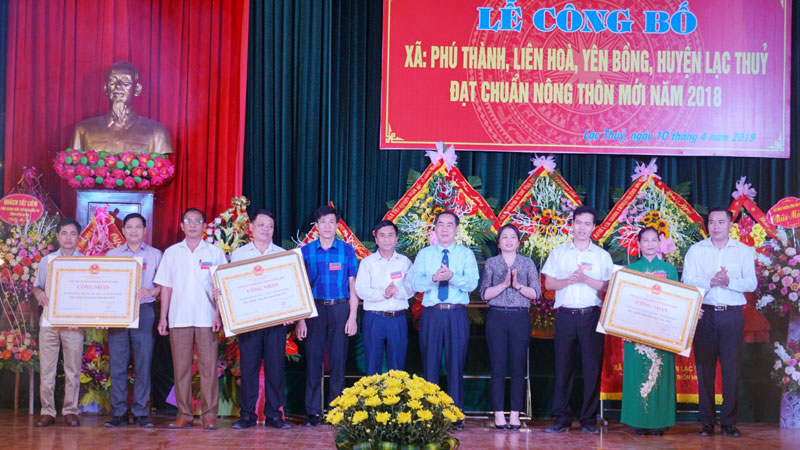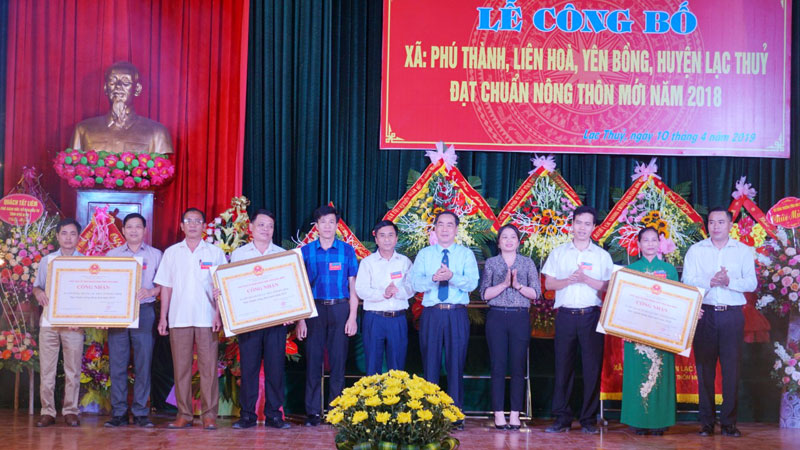
HBO – According to the People’s Committee of Lac Thuy district, the district’s State budget collection reached 11.3 billion VND (486.8 million USD) in the first quarter, equal to 17.6 percent of yearly estimates assigned by the provincial People’s Committee, and 16.26 percent as assigned in a resolution of the district’s People’s Council.
In 2011, the three communes reached only five out of the 19 criterion
of anew-style rural area. To 2018, the communes met
all criteria. Per capita income of the
three localities reached 38.9 million VND, 2.5 times higher than that of 2011,
of which Phu Thanh commune reported per capita income of 38.8 million VND; Lien
Hoa commune, 32.5 million VND; and Yen Bong commune, 33 million VND.
The rate of poor households averagely decreased to 10.98 percent, of
which Lien Hoa commune was 6.64 percent; Phu Thanh commune 10.95 percent; and
Yen Bong commune 11.8 percent.
The rate of employed workers of the
three communes averagely reached 95.5 percent.Of this, Lien Hoa commune reached 91.2 percent; Yen Bong commune 93.9
percent, and Phu Thanh commune 96.7
percent. The communes have cooperatives operating in accordance with legal regulations,
and have consumption-linked production model such as high-quality rice
cultivation, production of fruit and forest trees.
Vice
Secretary of the provincial Party Committee and Chairman of the provincial
People’s Committee Nguyen Van Quang hands over certificates of recognition of new-style
rural area status in 2018 to representatives from the three communes.
In the 2011-2018 period, total resources
mobilized for implementing the new-style rural area development programme in
the three communes was 617.2 trillion VND. For the 2019-2020, the communes set
a target to improve the quality of criteria, seeking to be recognised as new-style
rural communes. The localities will also take advantage of resources to develop
infrastructure facilities serving goods production and improving the living conditions
as well as incomes for local people.
Speaking at the
ceremony, Chairman of the provincial People’s Committee Nguyen Van Quang stressed
that the recognition for the three communes is an import event but it is just an
initial result.
He asked the communes to continue paying attention to maintaining and improving
the quality of the criteria, towards building model new-style rural communes in
the future.
According to data from the Hoa Binh Provincial Party Committee, the industrial production index for the first six months of 2025 is estimated to have increased by 20% compared to the same period last year. This marks the highest year-on-year growth rate for this period since 2020.
In the first six months of 2025, Hoa Binh province’s export turnover was estimated at 1.145 billion USD, marking an 18.11% increase compared to the same period in 2024. Import turnover was estimated at $ 804 million, a 17.15% increase, which helped the province maintain a positive trade balance.
The lives of the ethnic minority farmers in Tan Lac district have gradually improved thanks to the new directions in agricultural production. This is a testament to the collective strength fostered through the professional associations and groups implemented by various levels of the district’s Farmers’ Union.
With the motto the "product quality comes first,” after nearly one year of establishment and operation, Muong village’s Clean Food Agricultural and Commercial Cooperative, located in Cau Hamlet, Hung Son Commune (Kim Boi district), has launched reputable, high-quality agricultural products to the market that are well-received by consumers. The products such as Muong village’s pork sausage, salt-cured chicken, and salt-cured pork hocks have gradually carved out a place in the market and they are on the path to obtaining the OCOP certification.
In the past, the phrase "bumper harvest, rock-bottom prices" was a familiar refrain for Vietnamese farmers engaged in fragmented, small-scale agriculture. But today, a new spirit is emerging across rural areas of Hoa Binh province - one of collaboration, organisation, and collective economic models that provide a stable foundation for production.
Maintaining growing area codes and packing facility codes in accordance with regulations is a mandatory requirement for agricultural products to be eligible for export. Recently, the Department of Agriculture and Environment of Hoa Binh province has intensified technical supervision of designated farming areas and packing facilities to safeguard the "green passport" that enables its products to access international markets.



